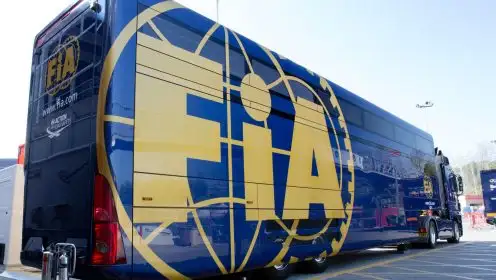FIA president highlights two issues as F1 teases more Sprint races

Mohammed Ben Sulayem took over from Jean Todt in 2021.
FIA president Mohammed Ben Sulayem has expressed concerns about the unique challenges that additional F1 Sprint races could bring, citing both the extra burden on staff as well as the issue of team travel.
His words follow recent statements by Formula 1 CEO Stefano Domenicali, who has noted that the sport is considering a variety of race weekend format tweaks in a bid to continue generating fans — including perhaps doubling the number of Sprint races taking place in a season.
FIA president raises Sprint race concerns
Since first being introduced to Formula 1 during three events in the 2021 season, Sprint races have become a more regular feature on the calendar.
Now, six different weekends boast a Sprint event. But that number could soon be doubling.
Ahead of the Azerbaijan Grand Prix, the 2026 Sprint calendar was confirmed, complemented with suggestions from the sport’s commercial rights holder that discussions are ongoing about increasing that figure from 2027.
That suggestion was met by pushback from both drivers and fans.
Drivers like Esteban Ocon have criticised the increase as introducing an “artificial” flavour to the sport, while rookies like Gabriel Bortoleto have expressed concern that F1 teams may avoid signing young drivers if a growing number of grand prix weekends were to feature just one practice session.
Fans, too, have offered mixed reviews of the Sprint format in general.
While some have appreciated the additional consequential on-track action — particularly those fans who have purchased tickets for a grand prix — others have argued that the Sprint format largely removes the strategic intrigue of a full-length event.
More F1 analysis from PlanetF1.com:
👉 F1 uncovered: Hidden details from the Azerbaijan GP exposed
👉 The biggest gaps overturned in modern F1 history shows the improbable task for Verstappen
Now, FIA President Ben Sulayem has offered some criticisms of an increase in Sprints, speaking with Viaplay after the Azerbaijan Grand Prix weekend.
First and foremost, he stated that “I also always think about the additional burden this places on our staff.”
FIA personnel are effectively tasked with overseeing the smooth and legal functioning of a race weekend, taking on tasks as diverse as inspecting wing angles, levying penalties for drivers deemed to have broken the rules, and ensuring that drivers have made their required media appearances.
One very simple example of the additional burden required of the FIA during a Sprint weekend has to do with parc fermé regulations.
During a normal race weekend, curfews dictate when team personnel are required to stop working on a car.
However, the addition of another qualifying and race session results in parc fermé conditions between Sprint qualifying and the Sprint race, then again between grand prix qualifying and the start of a grand prix.
That means FIA personnel are tasked with managing additional parc fermé conditions, as well as in levying penalties and managing on-track action for even more sessions.
But the FIA personnel won’t be the only folks impacted by a greater number of Sprints.
“They already travel a lot,” Ben Sulayem said. “We have to ask ourselves whether this is a good thing for the teams.”
Indeed, the F1 calendar has already hit the maximum 24 races allowed for by the Concorde Agreement, which means team personnel spend a large portion of the year on the road.
While the functional number of on-track sessions remains the same between a Sprint and a grand prix weekend, the stress of an additional qualifying and race, added to the dramatically reduced amount of practice time in which to work out kinks in the car, and you have a weekend that feels more taxing.
Formula 1 itself cannot make any concrete decisions regarding the number of Sprint races in a season, the concept must go through the usual governance process involving a vote of the F1 Commission and then ratification by the FIA World Motor Sport Council.
Domenicali’s comments are therefore one perspective on the current situation, and come from his desire to stay abreast of the wants and needs of an ever-evolving fanbase.
Drivers and other personnel are thus able to share their own perspectives on a Sprint increase, potentially serving to inform discussions going forward.
Read next: Surprise declaration for FIA Presidency emerges as time ticks down for formal application





